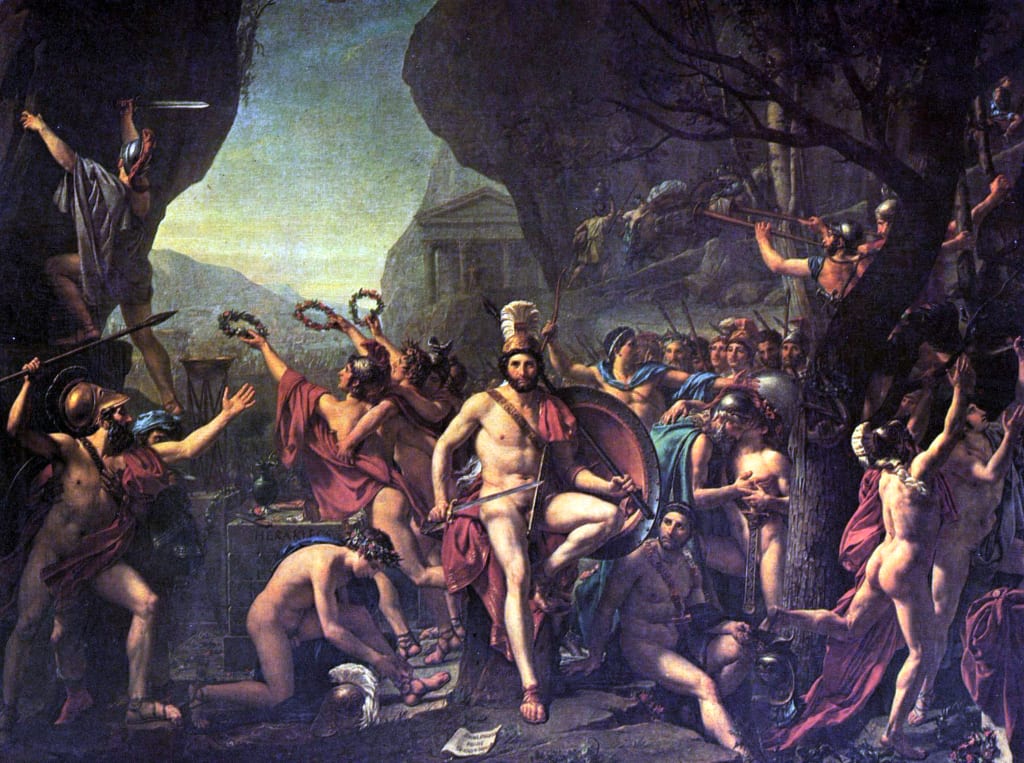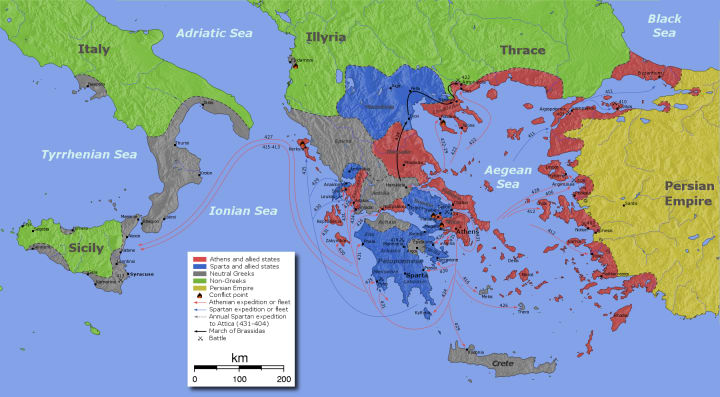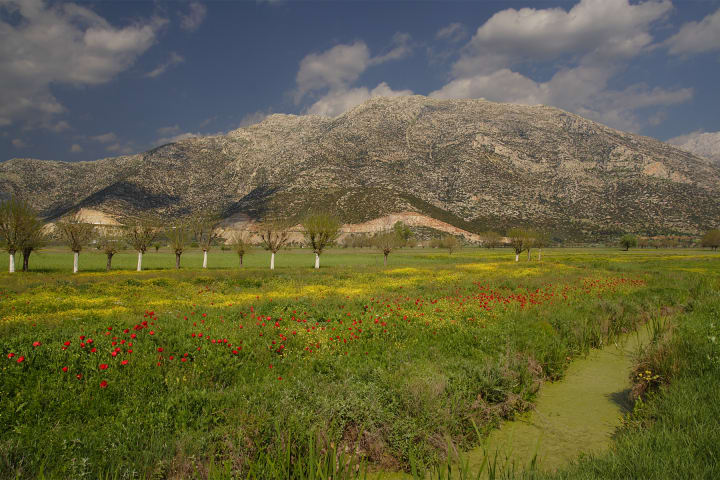Food that Conquered the world; Spartan Black Broth
The Soup That Felled Democracy

Everyone knows the legend of Leonidas and his brave 300, dying in glory against the unending onslaught of the Persian Empire under Xerxes. It has been immortalised in songs, poems, books for millennia, and then of course a very successful film.
But there is a huge amount left of the historical Spartan story. The warrior society was obsessed with physical performance and perfection, to the extent that ancient reports suggest infanticide was a common practice to instigate a primitive form of eugenics, with children being left on Mt Taygetus to die if they were deemed 'inferior'. The rigours of the agoge awaited those boys that survived, a brutal bootcamp that taught them all things war and what it meant to be a Spartan man.
This obsession and dedication to being the strongest, hardiest, and most powerful society in the ancient world of course influenced Spartan cuisine. Due to Spartan society's renaissance in the last few years, a lot more attention has been put onto how exactly the Spartans stayed in shape.
Contrary to what 300 may have led you to believe, the Spartans weren't built like gym bros. Many ancient sources comment on the strength and leanness of the Spartans, as well as their neatly groomed beards, braided hair and tallness. It would be more accurate to think of them as athletes, closer in build to swimmers than weightlifters.
The common practice of 'underfeeding' the young boys in the agoge is commented on by many Ancient Greek sources, notably Xenophon. "furnish for the common meal just the right amount for [the boys in their charge] never to become sluggish through being too full, while also giving them a taste of what it is not to have enough." (Xenophon, Spartan Society, 2)
It's important to note that they did not under nourish their children or themselves. There is evidence to suggest they were taller and broader than the average Greek of the day, a fact that simply couldn't be true if their society was chronically undernourished. They were austere with their food, as they were with all things.
Legendarily, they ate only Black Broth, a disgusting sounding amalgamation of pig's blood, vinegar and salt. Now, it should be noted that the exact recipe has been lost to history, so there may have been more to it that this, but even still, it does sound pretty bad.
We should consider two things though. One, the source of most of the information on Spartan cooking is incredibly biased and they had vested interest in making the Spartan way of life seeming barbaric, cruel, and unappealing. Secondly, where this broth was being consumed.
It is entirely plausible that the Spartans ate this dish, ate it frequently in fact, but only when on campaign. It is a quick, hardy meal, and easy to prepare and locate the ingredients for - essentially, the perfect wartime food.

Peloponessian Alliances From this we can gather one thing - the Spartans ate this broth while they conquered their neighbours. The oppressed may have lost, but they made sure that in the cultural and culinary refinement of the day, they would win. The Spartans did in fact conquer most of Greece at one point. Over the course of The Peloponnesian Wars with the Athenian League, the Spartans, with the help of the Persians, overran even Athens, extinguishing the flame of democracy and carrying out a reign of terror that wouldn't truly be broken until Alexander the Great.
So, the Spartans ate Black Broth as they conquered and made war, but what about the rest of the time? It is actually remarkably difficult to find accurate sources. The Spartans themselves were notoriously closed off, which is one of the reasons for the bias against their food, we have almost no Spartan sources. Instead we can turn to geography.
The Geography of Sparta is a dream for any warrior society. Flanked by Mt. Taygetus and Mt. Parnon, nestled in the valley of Evrotas and surrounded by hills, it is the perfect defensible location. It's also perfect for agriculture and farming, as well as hunting.
We know they certainly kept sheep and goats, whose milk was in turn used to make cheese, a skill they became renowned for. They also consumed bread, though this was usually made with barley, again suggesting they cultivated the land they controlled.
Meat was more common in Sparta than in the rest of Greece, where fish was the staple. It has been suggested that this is one possible reason for their increased stature and strength over their neighbours. As a landlocked city-state, they didn't have easy access to the rich fishing waters of the Mediterranean, and so slaughtered the sheep, goats, chickens and pigs they kept.
Hunting was of course another invaluable source of meat, and the rich lands around them allowed for the hunting of wild boars, rabbits and other game. Wine was also a big part of their food culture, though not as much as in the rest of Greece. Ancient wine was usually watered down and drunkenness was considered disrespectful in Spartan society, but they did drink with and after meals.
Again, this suggests some scale of cultivation of the land, keeping vineyards and tending to their grapes, with the area still producing highly respectable wine to this day.

The Peloponnese It probably wouldn't be a stretch to say that vegetables and fruits were also grown and consumed, though we don't know which ones, as a society of warriors can hardly function on meat and wine alone (as cool as that does sound). They were the height of physical fitness, so it's highly likely they ate a balanced and well-rounded diet, rather than endless bowls of Black Broth.
What's more, cooks were one of the few hereditary professions in Sparta, alongside kingship, flute-playing and heraldry. Because of its significance to the military, cooking in Sparta was highly honoured.
The likeliest answer for Sparta's bad reputation in the culinary world of Ancient Greece is likely a mix of historical bias and opposing palettes. The other Greek city states often favoured heavily spiced foods, rich and decadent, covered in sumptuous sauces. The austere Spartans preferred similar foods, and without easy access to a port, innovation from afar was unlikely and change was slow. Today we would probably applaud the simple, wholesome diet of the Spartans for its healthiness.
They of course did all this agriculture in the most Spartan way possible - violent repression and slavery. The class known as Helots were slaves for the Spartans, often conquered peoples, and outnumbered the Spartans as many as 10–1 during some periods. The Spartan warrior class ate well only through the forced labour of the peoples they oppressed. It has even been suggested that the reason for the Spartan avid fixation on Militarism wasn't to pillage and conquer their neighbours, but to keep the Helots from revolting.
While their reputation as heroes and semi-mythical demigods may be questionable, the fact that they ate a rich and varied diet is not. To this day, the area continues to fertile and produce some of the finest olives, wine and honey in Greece, a tradition tracing the area back to none other than the Spartans.
I want to leave you with a quote from an unknown receiver of the Black Broth, in case you're interested in trying one of the many recreations online. Upon tasting it, he was said to mutter in disgust, 'I now know why the Spartans do not fear death'.
Happy eating!





Comments
There are no comments for this story
Be the first to respond and start the conversation.